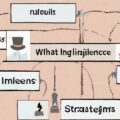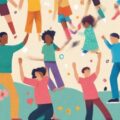Introduction
Developing strong social skills allows us to form meaningful connections, cultivate empathy, and collaborate effectively. While some struggle more than others, we all have room for improvement when it comes to relating skillfully.
What are Social Skills?
Social skills refer to the ability to communicate and interact positively with others. This includes both verbal and nonverbal behaviors like:
- Active listening
- Asking questions
- Maintaining eye contact
- Regulating tone of voice and facial expressions
- Showing interest in others
- Taking turns in conversation
Why Practice Social Skills?
Strong social skills allow us to:
- Make friends more easily
- Strengthen relationships
- Avoid and resolve interpersonal conflicts
- Collaborate smoothly in teams
- Gain confidence in social situations
How to Improve Social Skills
Here are 5 techniques for developing better social skills:
1. Observe Positive Role Models
Pay attention to those who interact skillfully and pick up on their verbal and nonverbal communication habits.
2. Challenge Negative Self-Talk
Notice critical inner voices that increase social anxiety and practice reframing those thoughts in a kinder way.
3. Practice Active Listening
Focus completely on the speaker, without thinking about what you’ll say next. Reflect back what you hear them saying.
4. Ask More Questions
Ask open-ended questions to understand others’ perspectives. Listen closely to their responses without judgement.
5. Role Play Difficult Situations
Practice potentially uncomfortable social interactions with a trusted friend to build confidence.
Social Skills Activities and Exercises
Below are 5 activities to help improve social skills:
1. Reading Facial Expressions
Use photos of faces showing different emotions and practice identifying the feeling being conveyed.
2. Conversation Starters
Generate open-ended questions to initiate meaningful dialogue around values, dreams, challenges, interests etc.
3. Improv Games
Do unscripted, spontaneous acting to flex creative social muscles and risk-taking.
4. Perspective Taking
Imagine yourself in another person’s situation to cultivate empathy and compassion.
5. Giving Genuine Compliments
Offer sincere praise to notice what you appreciate in others and make positive connections.
Frequently Asked Questions
What are the types of social skills?
Types of social skills include verbal communication, nonverbal communication, listening, cooperation, responsibility, empathy, politeness, and assertiveness.
What is the best way to improve social skills?
Some of the best ways to improve social skills are through practice, role playing, observing positive examples, perspective taking, and participating in team building activities.
Why are social skills important in life?
Social skills are important for forming relationships, working collaboratively, resolving conflicts smoothly, getting needs met, and overall wellbeing.
How can I be more socially active?
To be more socially active, step outside your comfort zone to initiate interactions, ask questions, listen fully to responses, share about yourself, pursue common interests with others.
What causes lack of social skills?
Lack of social skills can stem from social anxiety, negative past experiences, neurodiversity conditions like autism, or lack of positive role models and opportunities to practice relating well.









